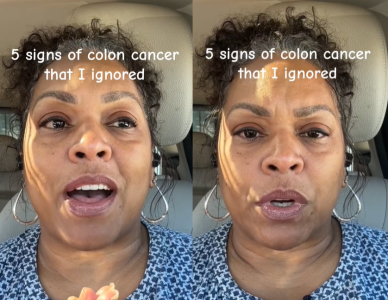44-year-old shares 5 subtle signs of colon cancer you might be ignoring right now
- Replies 0
Disclaimer: The information provided in this article is for educational purposes only and is not intended as a substitute for professional medical advice, diagnosis, or treatment. Always consult your physician or other qualified healthcare providers with any questions you may have regarding a medical condition or before making any changes to your health regimen.
Colon cancer is a silent predator, often lurking undetected until it reaches an advanced stage.
Cheryl, a vibrant individual at 44, learned this the hard way. Her experience is a wake-up call to all of us, especially as we age, to pay closer attention to our bodies and the subtle signals they send us.
The US Preventive Services Task Force's recent guideline change, which now recommends colorectal cancer screening starting at age 45, underscores the importance of vigilance.
Colon cancer has long been linked to older adults, especially those over 65.
However, the rates for colon cancer have been increasing steadily in adults below 50 years old since the 90s.
In 2012, at 44 years old, Cheryl was diagnosed with Stage 3C colon cancer. Since then, she’s been advocating for its awareness on social media.

“Don’t be like me if you are truly having issues, then go get checked,” Cheryl imparted. “Early detection is the key!! It’s ok to be nervous and afraid, but not to the point of doing nothing!”
Let's explore the five symptoms Cheryl ignored, which could be crucial in catching colon cancer early.
1. Persistent stomach aches after eating
Cheryl's story began with severe stomach pain after meals, a discomfort she initially brushed off as a possible food allergy. However, the pain persisted, turning her into an introvert, fearful of social situations where she might need to rush to the bathroom.
“Every time I ate something, I would get sick. My stomach would just hurt. It came to the point that I became an introvert because I couldn’t go out,” she said.
“I couldn’t do that because who knows when I would have to excuse myself and go to the bathroom. If you have a stomachache after two out of three meals, there’s something wrong.”
2. Changes in bowel movements
Our bowel habits can vary, but significant and persistent changes should not be ignored. Cheryl experienced a pattern of severe constipation followed by bouts of diarrhea, a red flag she overlooked. Regular bowel movements are a sign of a healthy digestive system, so any prolonged disruption warrants a conversation with your doctor.
“I would go three to four days without having a bowel movement and then diarrhea. This was in the early stages when if I had gone to the doctor and they did a colonoscopy, they might have seen the pre-cancerous polyps,” she said.
She highlighted that people who regularly depend on OTC medications “either to go to the bathroom or not go to the bathroom should seek medical treatment as soon as possible.”
3. Unexplained low iron levels
Two decades before her diagnosis, Cheryl faced issues with low iron, unable to donate blood due to anemia.
This condition, often a result of internal bleeding, can lead to fatigue, chest pain, and dizziness.
Anemia is a symptom in about 30% to 75% of colorectal cancer patients, as per a 2023 study.
4. Blood in the stool
One of the most alarming signs of colorectal cancer is blood in the stool, which Cheryl initially attributed to hemorrhoids.
However, as the cancer progressed, the blood darkened, indicating a more severe issue. Any rectal bleeding, whether bright red or dark, should be evaluated by a healthcare professional.
“I just thought it was normal, and then later on, when the cancer progressed, the blood was really dark, almost black. I was thinking the whole time that I had an ulcer,” she said.
5. Chest pain
Cheryl's exercise-induced chest pain and dizziness were signs of her body struggling to function with insufficient healthy red blood cells.
“It felt like my heart was going to beat out of my chest. And anytime I would stand up, I would feel faint.”
Source: @just.cherl / Tiktok.

Have you or someone you know experienced similar symptoms? How did you address them? Share your stories and insights in the comments below!
Colon cancer is a silent predator, often lurking undetected until it reaches an advanced stage.
Cheryl, a vibrant individual at 44, learned this the hard way. Her experience is a wake-up call to all of us, especially as we age, to pay closer attention to our bodies and the subtle signals they send us.
The US Preventive Services Task Force's recent guideline change, which now recommends colorectal cancer screening starting at age 45, underscores the importance of vigilance.
Colon cancer has long been linked to older adults, especially those over 65.
However, the rates for colon cancer have been increasing steadily in adults below 50 years old since the 90s.
In 2012, at 44 years old, Cheryl was diagnosed with Stage 3C colon cancer. Since then, she’s been advocating for its awareness on social media.

Cheryl, who was diagnosed with stage 3 colon cancer at 44, shared five symptoms she ignored which could have led to earlier diagnosis: severe stomach pain after meals. Image source: @just.cherl / Tiktok.
“Don’t be like me if you are truly having issues, then go get checked,” Cheryl imparted. “Early detection is the key!! It’s ok to be nervous and afraid, but not to the point of doing nothing!”
Let's explore the five symptoms Cheryl ignored, which could be crucial in catching colon cancer early.
1. Persistent stomach aches after eating
Cheryl's story began with severe stomach pain after meals, a discomfort she initially brushed off as a possible food allergy. However, the pain persisted, turning her into an introvert, fearful of social situations where she might need to rush to the bathroom.
“Every time I ate something, I would get sick. My stomach would just hurt. It came to the point that I became an introvert because I couldn’t go out,” she said.
“I couldn’t do that because who knows when I would have to excuse myself and go to the bathroom. If you have a stomachache after two out of three meals, there’s something wrong.”
2. Changes in bowel movements
Our bowel habits can vary, but significant and persistent changes should not be ignored. Cheryl experienced a pattern of severe constipation followed by bouts of diarrhea, a red flag she overlooked. Regular bowel movements are a sign of a healthy digestive system, so any prolonged disruption warrants a conversation with your doctor.
“I would go three to four days without having a bowel movement and then diarrhea. This was in the early stages when if I had gone to the doctor and they did a colonoscopy, they might have seen the pre-cancerous polyps,” she said.
She highlighted that people who regularly depend on OTC medications “either to go to the bathroom or not go to the bathroom should seek medical treatment as soon as possible.”
3. Unexplained low iron levels
Two decades before her diagnosis, Cheryl faced issues with low iron, unable to donate blood due to anemia.
This condition, often a result of internal bleeding, can lead to fatigue, chest pain, and dizziness.
Anemia is a symptom in about 30% to 75% of colorectal cancer patients, as per a 2023 study.
4. Blood in the stool
One of the most alarming signs of colorectal cancer is blood in the stool, which Cheryl initially attributed to hemorrhoids.
However, as the cancer progressed, the blood darkened, indicating a more severe issue. Any rectal bleeding, whether bright red or dark, should be evaluated by a healthcare professional.
“I just thought it was normal, and then later on, when the cancer progressed, the blood was really dark, almost black. I was thinking the whole time that I had an ulcer,” she said.
5. Chest pain
Cheryl's exercise-induced chest pain and dizziness were signs of her body struggling to function with insufficient healthy red blood cells.
“It felt like my heart was going to beat out of my chest. And anytime I would stand up, I would feel faint.”
Source: @just.cherl / Tiktok.
Key Takeaways
- The US Preventive Services Task Force has lowered the recommended age for colorectal cancer screening from 50 to 45 due to rising cases in younger individuals.
- Colorectal cancer is a leading cause of cancer-related deaths, and early detection can significantly improve survival chances.
- Cheryl, who was diagnosed with stage 3 colon cancer at 44, shared five symptoms she ignored which could have led to earlier diagnosis: severe stomach pain after meals, abnormal bowel movements, low iron levels, elevated heart rate and dizziness, and blood in the stool.
- It is critical to not dismiss potential warning signs of colorectal cancer, and anyone experiencing symptoms such as those described by Cheryl should seek medical evaluation promptly.
Have you or someone you know experienced similar symptoms? How did you address them? Share your stories and insights in the comments below!
Last edited:






